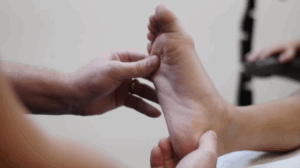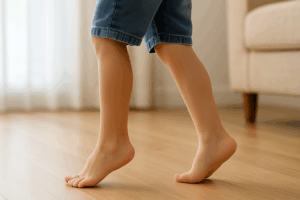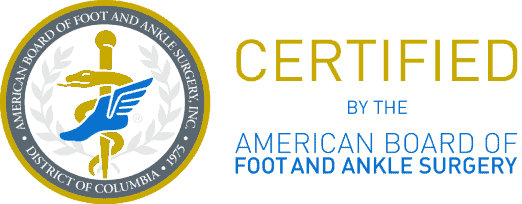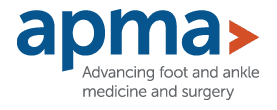What is Sever’s Disease?
Sever’s disease, also known medically as calcaneal apophysitis, is a painful inflammation in a child’s heel. This condition is typically brought on by a dramatic growth spurt when the heel bone grows faster than the surrounding muscles and tendons, causing them to become overstretched and tight. Girls may see their spurts between 7 – 13 years old, while boys will experience them around 10 – 15 years of age, depending on their individual development rates.
Identifying Sever’s Disease
The primary indication of Sever’s disease is heel pain in one or both of the child’s heels. However, an official diagnosis should always be carried out by a pediatric podiatrist or other children’s foot specialists.
The Diagnostic Process
In a clinical setting, Sever’s disease is identified by applying pressure to the child’s heel, specifically by squeezing firmly on the sides. This pressure will typically result in immediate discomfort for the child. Advanced imaging techniques, such as MRI and/or x-rays, can also be used to confirm the diagnosis conclusively.
Acute vs Chronic Sever’s Disease: What’s the Difference?
Depending on the type of Sever’s your child has—acute or chronic—different treatment options will provide the best results.
Acute Sever’s Disease
Acute Sever’s is less severe and typically resolves on its own or responds well to conservative treatments. These may include:
- Elevating the leg and applying ice (not directly on the skin) for 15 to 20 minutes, three times a day
- Over-the-counter medications such as Acetaminophen (Tylenol) or Ibuprofen (Advil and Motrin)
- Rest and avoidance of strenuous activities like running, soccer, and gymnastics for two to four weeks
Chronic Sever’s Disease
Chronic Sever’s is more severe and doesn’t respond to the conservative treatments mentioned above. A custom orthotic, fabricated specifically for the child’s foot, is generally considered the best treatment option. These orthotics:
- Are cast specifically from your child’s foot for an accurate fit
- Serve as a heel cup that evenly distributes weight, relieving pressure on the growth plate and promoting healing
- Are usually prescribed in conjunction with a nighttime splint to prevent the tendons and muscles from tightening overnight
The Mikki Device: A Potential Solution
The Mikki Device™ is a custom orthotic shoe insert designed specifically to treat Sever’s disease in children. Even when other Sever’s treatment options have failed, the Mikki Device has proven effective in a vast majority of cases.
Causes and Symptoms of Sever’s Disease
Several factors may increase your child’s chances of contracting Sever’s disease, including:
- A rapid growth spurt between the ages of 8 to 15
- Participation in high-impact activities like soccer, running, dance, or gymnastics
- Specific foot conditions such as pronation or high or flat arches
- Tight Achilles tendon
- Being overweight or suffering from obesity
- Short leg syndrome
In addition to heel pain, other symptoms of Sever’s disease can include difficulty with walking, discomfort when the heel is squeezed, redness or swelling of the heel, stiffness in the feet, and an altered walking style to avoid putting pressure on the heel.
Treating Sever’s Disease
The main goal in treating Sever’s disease is to alleviate pain. Depending on whether your child’s condition is acute or chronic, the approach will vary. In most cases, the doctor will advise cutting back on activities and sports until the swelling decreases and the pain subsides. Other treatment methods include:
- Leg and foot exercises that focus on strengthening and stretching the affected muscles and tendons
- Applying a compression stocking to reduce swelling
- Elevating the foot and applying ice to help manage pain and inflammation
- Using an over-the-counter pain reliever for temporary pain relief
- Using a custom orthotic, like The Mikki Device™, specifically designed for the child’s foot
Don’t Hesitate to Reach Out
If your child is experiencing any of the symptoms of Sever’s disease discussed in this guide, please don’t hesitate to make an appointment or contact our office at (480) 534-7220. The health of your child’s feet is instrumental in determining their quality of life, both now and in the future.
Remember, your child’s feet are crafted for life. Let’s work together to ensure they have a sturdy and robust foundation.







